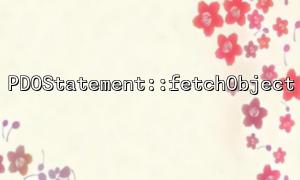In PHP, PDO (PHP Data Objects) is an important tool for interacting with databases. It provides a lightweight and unified interface to access the database. When you use the PDOStatement::fetchObject() method to get data, you may sometimes encounter situations where empty objects are returned. This situation may confuse the developer and not know how to deal with it. This article will explain how to deal with this situation and provide some common solutions.
The PDOStatement::fetchObject() method is a feature in the PDO extension that allows you to get single rows of data from query results and map it into an object. Unlike the fetch() method, fetchObject() converts the result row into an object of a specified class (or an anonymous class object).
For example:
<?php
$stmt = $pdo->prepare('SELECT id, name FROM users WHERE id = :id');
$stmt->bindParam(':id', $id, PDO::PARAM_INT);
$stmt->execute();
$user = $stmt->fetchObject(); // Get a line and convert it into an object
When fetchObject() is called to return an empty object, there may be several reasons:
The query has no results: if the query does not return any data, fetchObject() will return false . In this case, we will get an empty object indicating that no record matching the criteria was found.
Fields do not match class attributes: If you pass in a custom class and the query field name does not match the class attribute name, fetchObject() may return an empty object. This is because by default, fetchObject() maps database fields to the object's properties.
Database connection problem: If there is a problem with the database connection, the query may not be executed successfully, resulting in an empty result being returned.
First, make sure that the query results are not empty. If the query has no results, fetchObject() will return false . Therefore, after calling fetchObject() , you should first check whether the return value is false .
<?php
$stmt = $pdo->prepare('SELECT id, name FROM users WHERE id = :id');
$stmt->bindParam(':id', $id, PDO::PARAM_INT);
$stmt->execute();
$user = $stmt->fetchObject();
if ($user === false) {
echo "No user found!";
} else {
echo "user ID: " . $user->id . ", user名: " . $user->name;
}
If you use a custom class and the query field does not match the class's properties, you can use the constructor or __set() method to ensure that the class can correctly receive and process the database fields.
class User {
public $id;
public $name;
public function __construct($id = null, $name = null) {
$this->id = $id;
$this->name = $name;
}
public function __set($name, $value) {
// Dynamically set attribute values according to field names
$this->$name = $value;
}
}
$stmt = $pdo->prepare('SELECT id, name FROM users WHERE id = :id');
$stmt->bindParam(':id', $id, PDO::PARAM_INT);
$stmt->execute();
$user = $stmt->fetchObject('User');
if ($user) {
echo "user ID: " . $user->id . ", user名: " . $user->name;
} else {
echo "No user found!";
}
If fetchObject() always returns an empty object, and there is no problem with the query SQL statements and parameters, you can check whether the database connection is normal. Make sure the database server is not faulty and that the SQL query is executed correctly.
<?php
$pdo = new PDO('mysql:host=localhost;dbname=testdb', 'root', '');
$pdo->setAttribute(PDO::ATTR_ERRMODE, PDO::ERRMODE_EXCEPTION);
$stmt = $pdo->prepare('SELECT id, name FROM users WHERE id = :id');
$stmt->bindParam(':id', $id, PDO::PARAM_INT);
$stmt->execute();
$user = $stmt->fetchObject();
if ($user === false) {
echo "Query failed or no data!";
} else {
echo "user ID: " . $user->id . ", user名: " . $user->name;
}
If the problem persists, you can confirm whether the query itself is incorrect by debugging the SQL query. You can use var_dump() or print_r() to output the query results to see if the expected data exists.
<?php
$stmt = $pdo->prepare('SELECT id, name FROM users WHERE id = :id');
$stmt->bindParam(':id', $id, PDO::PARAM_INT);
$stmt->execute();
// Output SQL Query results
var_dump($stmt->fetchAll());
The case where PDOStatement::fetchObject() returns an empty object is usually related to query results, field matching, or database connection. This problem can be effectively avoided and solved by checking the return value, ensuring that the fields match the attributes of the class, and debugging queries. In actual development, good error handling and debugging methods are the key to ensuring application stability and maintainability.
Related Tags:
PDOStatement














